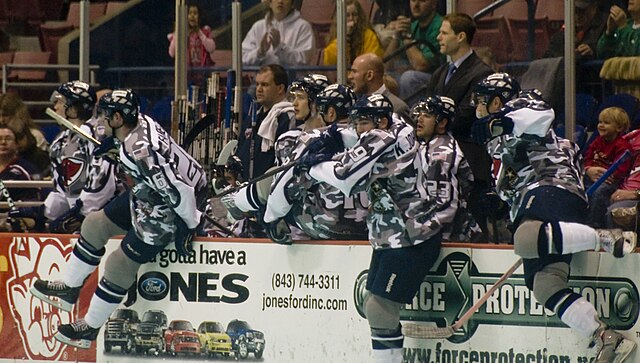The World Cup of Hockey is an international ice hockey tournament. Inaugurated in 1996, it is the successor to the Canada Cup, which was held every 3 to 5 years from 1976 to 1991 and was the first international hockey championship to allow nations to field their top players. The World Cup has occurred thrice before on an irregular basis, with the United States winning in 1996 and Canada winning in 2004 and 2016. Following the 2016 tournament, it was uncertain if the series would be continued, after the cancellation of the 2020 tournament. It is tentatively scheduled to be held in 2028, and every four years afterward.
1996 World Cup trophy
Ice hockey is a team sport played on ice skates, usually on an ice skating rink with lines and markings specific to the sport. It belongs to a family of sports called hockey. In ice hockey, two opposing teams use ice hockey sticks to control, advance, and shoot a closed, vulcanized, rubber disc called a "puck" into the other team's goal. Each goal is worth one point. The team which scores the most goals is declared the winner. In a formal game, each team has six skaters on the ice at a time, barring any penalties, one of whom is the goaltender. Ice hockey is a full contact sport, and is considered to be one of the more physically demanding team sports. It is distinct from field hockey, in which players move a ball around a non-frozen pitch using field hockey sticks.
An ice hockey forward (Bryan Rust of the Pittsburgh Penguins) shoots toward a net defended by a goaltender (Braden Holtby of the Washington Capitals).
VTB Arena is an example of an indoor ice hockey arena. The arena is used by HC Dynamo Moscow.
Players from the South Carolina Stingrays perform a line change. A line change is a substitution of an entire line at once.
Scoreboard for a hockey game during the fourth period. If a game is tied at the end of the third period, several leagues and tournaments have teams play additional sudden death overtime periods.





